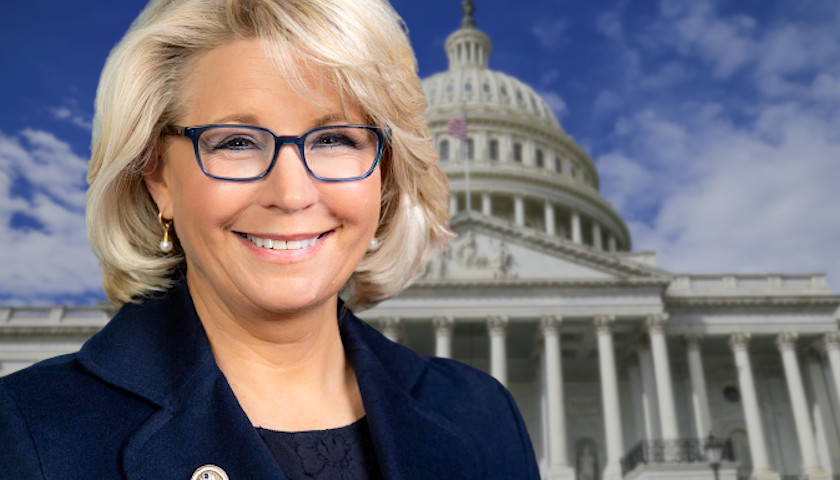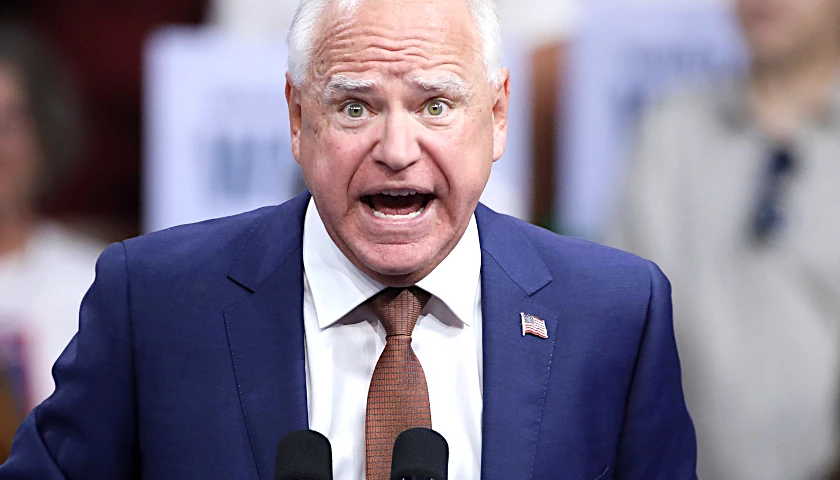by Jeremy Carl
To the delight of actual conservatives everywhere, it appears that U.S. Representative Liz Cheney (R-Wyo.) will soon finally be out of the GOP leadership, rectifying a huge mistake made less than three months ago by House Minority Leader Kevin McCarthy (R-Calif.) and House GOP leadership when they steadfastly supported her against a groundswell of calls from voters for her removal.
At that time, McCarthy passionately defended her presence in leadership ahead of a secret ballot vote, with many describing his contribution as decisive in turning the tide toward keeping Cheney as House GOP conference chairman. That McCarthy would be forced to reverse himself just a few months later shows that his judgment as a leader is fatally flawed.
The question conservatives should be asking now is not why we need to oust Liz Cheney but how she ever got into leadership in the first place?
Questioning “the Big Lie”
Typically, Cheney’s defenders, a toxic stew of RINOs, NeverTrumpers, and corporatists, have been self-aggrandizing in describing her constant sniping at Donald Trump and dividing the caucus. “If a prerequisite for leading our conference is continuing to lie to our voters, then Liz is not the best fit,” huffed Cheney’s fellow impeachment fan Representative Anthony Gonzalez (R-Ohio). Not to be outdone, Senate Minority Leader Mitch McConnell (R-Ky.) lauded Cheney ahead of the House leadership vote in February as someone “with deep convictions and the courage to act on them.”
All of the Democrats and Conservatism, Inc. voices were in sync with the approved message—Cheney was a target because she “defied” Trump and because she “told the truth” about January 6.
“This is about whether the Republican Party is going to perpetuate lies about the 2020 election and attempt to whitewash what happened on January 6. Liz will not do that.” Cheney’s spokesman intoned.
Cheney herself pushed this line of thinking “The 2020 presidential election was not stolen. Anyone who claims it was is spreading ‘the Big Lie,’ turning their back on the rule of law, and poisoning our democratic system.”
While her premise itself is flawed, it is still worth addressing because even on its own dishonest terms, it is easy to dismiss.
Does Cheney think it was a ‘big lie’ that numerous states held extended voting in direct violation of their election laws? Does she think it is a “big lie” that Big Tech consistently put its massive thumb on the scale for the Democrats, funding huge voter registration drives in Democratic areas (in violation of the law) and censoring news and banning users unfavorable to Biden?
Does Cheney think it was a “big lie” that the debates and their moderators were institutionally biased toward Biden? Does Cheney think it’s a “big lie” that the media polls were consistently rigged against Trump and used to manufacture a narrative? Does Cheney think it was a “big lie” that COVID-19 was used by Democrats and the Left as a political weapon? Does Cheney think it is a “big lie” that the January 6 protesters are being punished more severely than the Black Lives Matter and Antifa rioters who committed much more serious crimes?
Regardless of her personal feelings about Trump, if Cheney does not understand and explain to voters that the behavior of the Left, rather than that of Trump, constitutes an existential threat to our democracy, she is too naïve and stupid to be in GOP leadership.
Vindicating Daddy
But Cheney is not stupid or naïve. She has spent decades in the political arena. She is answering questions about Donald Trump because she wants to answer those questions. She’s tweeting about Donald Trump because she wants to tweet about him. She’s dividing the caucus because she wants to divide it. And her conduct has given aid and comfort to the Democrats while angering more than 90 percent of Republican voters.
Of course, Cheney’s motivations are not really about January 6 at all—they’re about September 11, and her father’s role in the disastrous handling of its aftermath.
She is obsessed with vindicating the reputation of her father, Vice President Dick Cheney, who left office with a 13 percent approval rating, one of the lowest in American history and whose failed strategies caused incalculable damage to his party and his country. Liz Cheney has been elevated to her high station out of gross nepotism, taking a leadership role unprecedented in modern history for a woman who was then just beginning her second term in Congress.
Her endless bellicosity and need to vindicate her father’s failed legacy led her to take the extreme step of endorsing the primary opponent of Thomas Massie (R-Ky.), a noninterventionist without a hint of scandal who is probably the brightest and certainly one of the most conservative members of Congress. His fatal flaw, in Cheney’s mind, is his critique of her family’s dangerous foreign policy legacy.
In an extended puff-piece Politico profile written just days before the 2020 election, it was clear that Cheney was fundamentally animated by her desire to see the GOP wield an aggressive and militaristic foreign policy like that of her father. “She wants nothing more than to put his views—her views—once again at the forefront of the GOP and redeem the Cheney name,” the article noted.
In one of the profile’s few negative comments, Donald Trump Jr. wrote that “The Bush-Cheney policies of forever war in the Middle East were rejected by GOP primary voters in 2016 and no longer reflect the views of most Republican voters. Unfortunately, there’s still a gigantic disconnect between some elected Republicans in Washington, D.C., and actual Republican voters on these issues.” That gap remains today.
Out of Step with Changing Times
A dedicated corporatist whose father was president of the multinational giant oilfield service company, Haliburton, Cheney is also deeply at odds with the more egalitarian economic direction the GOP is taking.
“Liz Cheney is certainly not going to be a person over the next 20 years who’s fighting to advance nationalism and populism,” said Steve Schmidt, a Cheney confidante who was the senior campaign strategist for John McCain before founding the Lincoln Project and eventually joining the Democratic Party. Yet GOP voters clearly want to take the party in a more populist and nationalist direction. Meanwhile, Dick Cheney’s recent autobiography thanked Max Boot, Bret Stephens, Stephen Hayes, Jennifer Rubin, and Bill Kristol, a veritable who’s who of neoconservative Trump haters and foreign policy disasters.
Cheney cannot acknowledge that the GOP has resoundingly rejected her and her father’s failed agenda on domestic and foreign policy. Instead she’s created a distraction, keeping the spotlight on Trump rather than our corrupt and dangerous opponents and trying to undermine the wishes of the vast majority of GOP voters.
It is notable that aside from the dead-ender neoconservatives, Cheney’s strongest public defenders in the GOP right now are those like David French and Senator Mitt Romney (R-Utah), whose only purpose in the political ecosystem at this point is to bleat pathetically about morality while serving as useful idiots for the Democrats’ immoral tactics and agenda.
The real scandal isn’t that Liz Cheney is no longer going to be a member of the Republican leadership. It’s that a mediocre veteran of one House term who was far out of step with her party’s voters ever got there in the first place. And that’s something for which McCarthy has to answer.
Perhaps, after Cheney slinks off in a deserved and ignominious defeat, he finally will.
– – –
Jeremy Carl is a senior fellow at the Claremont Institute. He served as deputy assistant secretary of the interior under President Trump and lives with his family in Montana.








